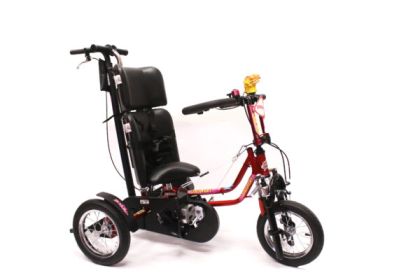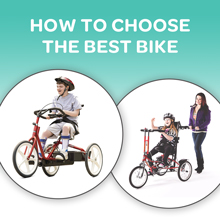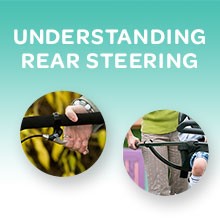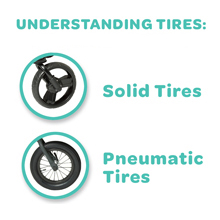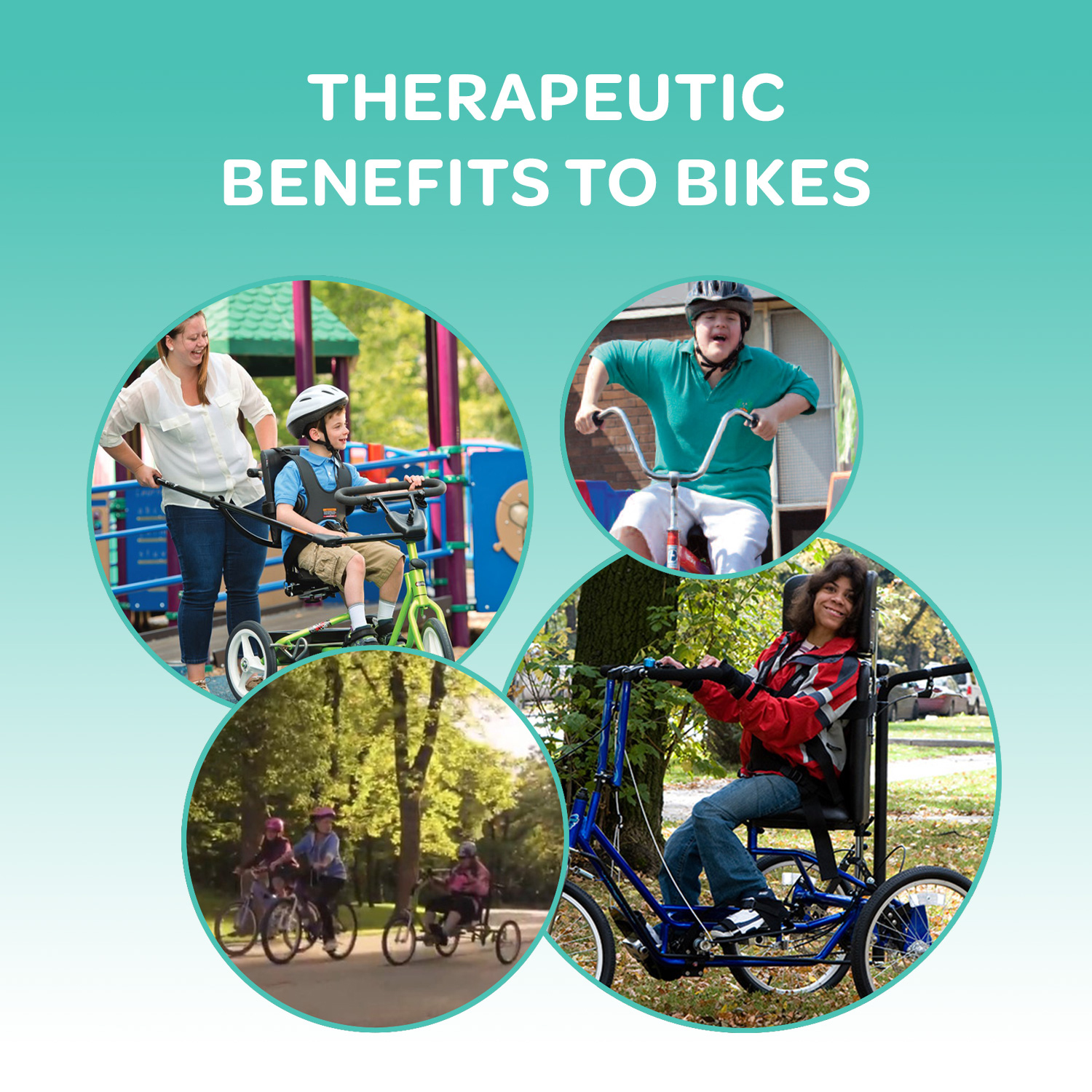The Freedom Concepts Discovery Series of Adaptive Tricycles is designed for children with special needs who have mild to significant physical impairment. These bikes are as suitable for riders with simple balance problems as they are for riders who have more complex issues associated with diagnoses such as cerebral palsy, spina bifida, Down syndrome, head injury, muscular dystrophy, autism, and dwarfism. Adaptive bikes are powerful therapy tools that can help improve a rider’s strength, endurance, and coordination. They are also an extremely effective tool for promoting inclusion. The basic features of the Discovery Series Tricycles make it easier for riders to begin to pedal and steer on their own. Multiple Quick Release Levers make most adjustments quick and tool free. The low step-through height combined with the ability to move handlebars out of the way facilitate safe transfers. The adjustments needed for the growth of one rider or needed to fit multiple riders are easy. The bike also comes with its own multi-tool for adjustments that are not managed with Quick Release Levers. As the customer, you will be given many choices to create a tricycle that offers just the right amount of support for your rider to experience the freedom of cycling and have a Lots of Fun!
This page will help guide you through the process of ordering the DCP Mini. The Critical Measurement for determining the size of the Discovery tricycle is the Inseam Measurement. The Inseam Measurement is the distance between the bottom of the rider’s heel to the top of the rider’s inner thigh. The DCP Mini Standard Frame is designed for riders aged 18 months to 3.5 years with inseam measurement between 8in.- 16in. The Mini is designed for the littlest riders and is a fun way to keep them motivated and striving towards their therapy goals. The Mini is 29in. wide and 42in. long. It is a popular choice for schools and therapy settings. The bike grows with one child or can easily be fit to multiple children.
Seating System
In Required Step 1 you will select the components of the Seating System. Height adjustments for the seat are accomplished using 2 quick release levers. The Standard Seating System is tilted back slightly (5 degrees) from fully upright creating an optimal seated position angle for pedaling. If a greater tilt angle is desired, the Adjustable Tilt Fork can be added in Required Step 6. This feature will add up to 10 degrees more tilt of the entire bike frame thereby increasing the posterior (backwards) tilt of the seat without needing to make any other adjustments. In Required Step 1 you will choose between a Child Seat Mini, Child Seat Small, and Child Small Pommel Seat. . The Child Seat Mini is 10in. wide, 9in. deep; Child Seat Small is 12.5in. wide, 12.5in. deep. The Child Small Pommel Seat adds a 2in. raised pommel which helps to keep the rider further back on the seat (discourages sliding forward) while promoting leg abduction (moving legs away from midline). This seat promotes greater stability of the seated posture. The back of the seat is a High Back. The Mini High Back is 12.5in. wide, 13in. high; Child High Back is 13 in. wide, 18 in. high. All seats come standard with an Adjustable Lap Belt and an Adjustable Chest Strap both with Side Release Buckles to secure the rider in the seat.
If the rider requires more postural support, a Headrest can be ordered. Headrests are available in 2 styles: Adjustable and Adjustable with Occiput Support Cushion. The Adjustable Headrest extends the seat back height an additional 7in. and allows the entire upper body to be supported. It is easily removed. The Adjustable Headrest with an Occiput Support Cushion provides additional neck support for the rider. The cushion is attached with Velcro and can be removed or adjusted as required. If you have chosen a Child Size Seat with Headrest (NOT available for Mini Size Seat) you can also purchase an Adjustable Sunshade Canopy (Rain Cover) . The Sunshade Canopy requires the headrest for attachment.
Steering and Brakes
Handlebars- the U Bar where the handlebar is attached has a quick release lever which allows the handlebars to be moved out of the way during transfers. The lever also allows the handlebars to be adjusted for different arm lengths. Choices of Handlebars include: Standard Hoop Handlebars are adjustable across 3 planes of movement making it possible to accommodate any upper extremity positioning needs. The right and left sides of the hoop can be adjusted independently from one another. Other options include: Enclosed Hoop and High Rise Handlebars. Please refer to Photo Gallery under Main Product Image for pictures.
Rear Steer Handle can be added in Required Step 3 and allows the caregiver to help with forward movement and steering. A hand brake can also be placed on the Rear Steer Handle. The bike comes standard with one Hand Brake which can be placed on Right or Left Handlebar(Except: Cannot be mounted on High Rise Handlebars), Rear Steering Handle (Must have purchased Rear Steering Handle) or T-Bar. An additional (second) Hand Brake can also be added in Required Step 3.
Standard on all Freedom Concepts Bikes is a Manual Parking Brake located on the right rear wheel. This brake should always be engaged when transferring riders on and off the bike.
The Steering Mechanism is adjustable. It can be locked or unlocked depending on whether the rider is able to steer on their own. When the steering mechanism is locked, the rider cannot control the direction of the tricycle. The bike will only move forward. This is especially beneficial to new riders who may not be able to steer safely or cannot keep their hands on the handlebars.
Propulsion/ Pedal Power/ Gearing Options
- Direct Drive- This is the Gearing Option most frequently chosen for the Discovery Tricycles because there is a direct correlation between the pedals moving and the tricycle moving. When the pedals move forward the bike moves forward. When the pedals are moved backwards the tricycle goes backwards. If the rider stops pedaling on their own and a caregiver is pushing the bike forward using the steering handle, the pedals will still go around. For brand new riders and for some riders who may have difficulty understanding cause and effect, this is the quickest way for a rider to understand “When I push down on the pedals, I move the bike.” When the bike is moving, the pedals are moving. When choosing Direct Drive, you will also be asked to choose the Pedal Power: Easy or Average.
- Free Wheel- This is the Gearing Option that will allow the rider to coast. When the rider pushes down on the pedal, the bike will move forward. When they stop pedaling and have established enough forward momentum for the bike to continue to move forward, they will coast. If a caregiver pushes the bike forward using the steering handle and the rider is too tired to pedal, they can rest their legs while the bike moves forward. For riders who do not understand the correlation between the pedals moving forward and the bike moving forward, this will slow down their learning curve as they may think “Oh look, I’m not pedaling and I’m moving! This is better!” When choosing Free Wheel, you will also be asked to choose the Pedal Power: Easy or Average.
- On/Off Pin Reciprocator- Choosing this option will provide both Direct Drive and Free Wheel options. By pulling out the on/off pin, the bike will be set in Free Wheel. Simply push the pin back in and the pedals will be fully engaged in Direct Drive mode. Pedal Power is Easy
Bells, Horns and Decals
All Discovery Series Tricycles come standard with a Bell, a Horn and Decals. Bells are offered in several colors. Squeaky Horns are offered in many different animal shapes. Please refer to Photo Gallery under Main Product Image for pictures of Decal choice (Racer, Hibiscus, Jungle).
Tire Style- There are 3 tire styles to choose from. Smooth Solid Tires are recommended for indoor riding and are puncture proof (“Never-Go-Flat”) because they are not filled with air. This is the tire of choice for many multi-user environments such as schools and therapy clinics. Pneumatic Tires (Air-filled) Knobby or Smooth are recommended for outdoor riding. The Knobby Pneumatic Tires will offer the greatest degree of traction which will ultimately mean a little more force will be required for pedaling.
Pedal Style/ Footplates- Helping riders with special needs to keep their feet securely on the pedals can be an issue. Several styles of pedals/ footplates are offered to ensure success.
- Mountain Pedal with Toe Cage- This pedal is offered in one size. Mountain Pedals are recommended for riders that have some control over their foot placement and are most effective for individuals with high muscle tone who tend to point their toes when exerting pressure on the pedal.
- Neoprene Adjustable Footplates- The Neoprene Adjustable Footplate is offered in 2 sizes. The Neoprene material used to create the heel cup is flexible. There are 2 straps on this footplate. The ankle strap has a side release buckle closure. The strap across the foot has a Velcro closure. This footplate offers a quick and easy way to maintain proper positioning and pedal pressure and is recommended for children with low muscle tone. SIZES- Small 4in. x 7in. Medium 4.5in. x 10in
- Molded ABS Footplates- Molded ABS Footplates have a rigid plastic heel cup and 2 straps to secure the rider’s foot to the pedal. The heel cup helps the rider to generate force when pedaling. The ankle strap has a side release buckle closure. The strap across the foot has a Velcro closure. This Footplate is designed to provide precise positioning for children with spasticity and helps with knee flexion and alignment of the leg. SIZES- X-Small: 2.5in. x 6in. Small: 3in. x 7in. Medium: 3in. x 10.75in.
- Molded ABS with Ratcheting Straps-This is the best option if you are looking for maximum support to keep the rider’s feet in position. This foot plate is designed for those riders whose foot seems to pull away from the pedal no matter how you have attempted to secure it. It has the rigid plastic heel cup with ratchet straps at the ankle and over the foot. This footplate is recommended for children with plantar flexion (toe points downward.) SIZES- X-Small: 2.5in. x 6in. Small: 3in. x 7in. Medium: 3in. x 10.75in.
- Pulley Strings- Pulley Strings attach to the pedals of the bike to help keep pedals level. Please refer to Photo Gallery under Main Product Image for picture. Front Pulley assists are appropriate for riders who tend to point their toes while pedaling (foot moves into plantar flexion). The Rear Pulley helps self-level the pedal.
- Leg support (Brace)- If the rider requires support to assist with alignment of one or both legs, a Leg Support Brace can be attached to a Foot Plate with Molded ABS Heel Cup ONLY. Leg Support can be added to one or both pedals. Calf Circumference Measurement is required. If the rider plans to wear an AFO in addition to having the Leg Support on the Foot Plate, the Calf Circumference Measurement should be made when the AFO is in place. Leg Supports require use of the Rear Pulley System which will be included if a Leg Support is ordered.
Crank Arm Length- The Crank Arm is the lever that the pedal is attached to. The Standard Alloy Crank Arm for the Mini is 3in. If your rider would benefit from a shorter Crank Arm Length on one side or both, a Crank Arm Length Shortener is available and will reduce the length of the Crank Arm by .5 in. With a shorter crank arm, the pedal will feel a little easier to pedal.
Is this Product Right for You?
- Appropriate for children with mild to significant physical limitations
- Child’s Inseam Measurement must be between 8in.- 16in.
- Maximum User Weight is 60 lbs. (27kg)
- Questions? Our therapists can help you with a proper fit. To start please click SIZING HELP and complete a simple form, or call us toll free at (800) 371-2778

